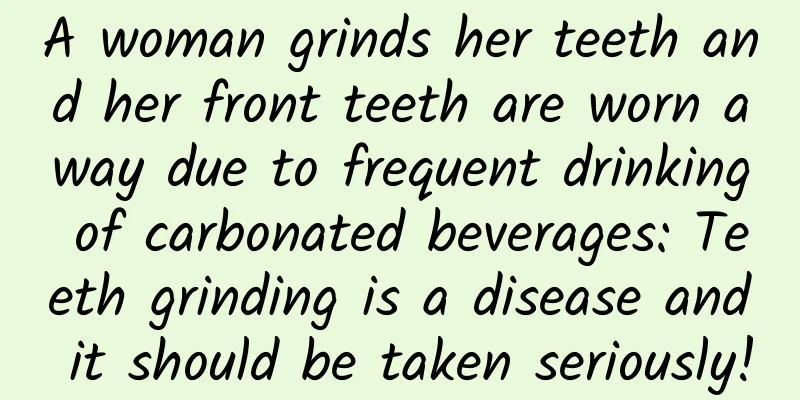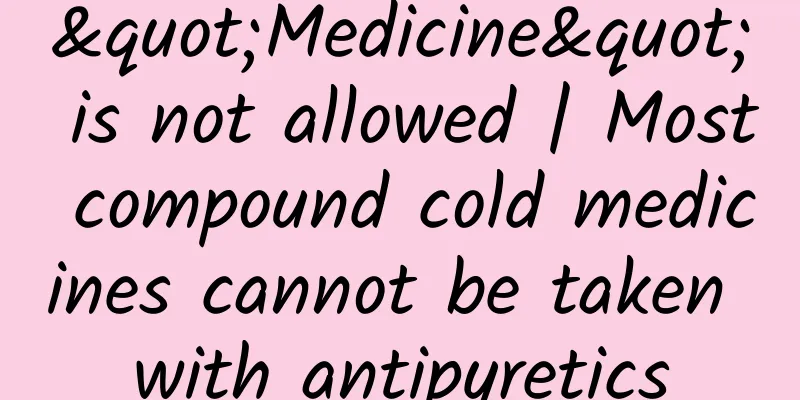A woman grinds her teeth and her front teeth are worn away due to frequent drinking of carbonated beverages: Teeth grinding is a disease and it should be taken seriously!

|
Expert of this article: Wang Yuxuan, PhD in Stomatology, Peking University Health Science Center When I lived in the dormitory, the sound I feared most at night was teeth grinding. In the dead of night, there were bursts of creaking sounds, which made people's hair stand on end... Some people grind their teeth not only when they sleep, but also when they are nervous or angry. If you frequently grind your teeth together without realizing it, you may be suffering from bruxism. Teeth grinding is a disease that many people fail to treat in time, leading to serious consequences. How to determine if you have bruxism? Bruxism is an involuntary oral movement of clenching or grinding the teeth. According to the time of occurrence, it is generally divided into two categories: awake bruxism (AB) and sleep bruxism (SB). Sleep bruxism can occur in children as young as 4 years old, while awake bruxism is more common in adults. How to determine if you have bruxism? You should be careful when you have the following symptoms: 1. Pain and stiffness in the jaw muscles and joints; 2. Teeth are worn; 3. Headache (especially when just waking up); 4. Teeth are sensitive to cold and hot stimuli; 5. Tooth marks appear on both sides of the tongue; 6. Poor sleep quality and insomnia; The causes of bruxism are quite complex. 1. Studies have shown that the occurrence of bruxism is closely related to psychological factors. 2. People who are under greater pressure in life and have more anxiety are more likely to suffer from bruxism. 3. Sleep bruxism is often associated with obstructive sleep apnea syndrome (OSAHS). Many patients with bruxism often have symptoms such as difficulty breathing and snoring during sleep. 4. Teeth occlusion factors and some neurological diseases (such as Parkinson's disease, epilepsy, etc.) may induce bruxism. 5. Smoking and drinking caffeinated beverages may also increase the risk of bruxism. What are the dangers of teeth grinding? The main harm of bruxism comes from excessive muscle contraction and the continuous or strong biting force it produces. It is estimated that people who grind their teeth can clench their teeth with six times the force of a normal bite. Bruxism causes abnormal non-physiological wear of teeth. In the early stages, it may make the teeth sensitive to cold and heat. When the wear worsens, it will cause tooth pain, looseness, and chipping, and eventually lead to only residual roots or even extraction of teeth. In addition to damage to teeth, bruxism can also cause a series of problems with the temporomandibular joint and muscles, including difficulty opening and closing the mouth, joint clicking, pain in the maxillofacial area, and even the head and neck, seriously affecting eating and resting. What should I do if I have bruxism? It is currently believed that there is no effective way to eradicate bruxism, but we can reduce the harm caused by bruxism through some symptomatic treatments. 1. Wear soft pads For most patients with mild bruxism, we routinely use soft occlusal splints for treatment in clinical practice. Wearing a soft pad can not only avoid direct contact between the upper and lower teeth and reduce tooth wear, but also relieve muscle tension and achieve the purpose of reducing bruxism. 2. Use physical therapy, local injection and other methods For patients with obvious predisposing factors, causal treatment should be carried out according to the specific circumstances. For patients with obvious muscle tension, physical therapy, local injection and other methods can be used to reduce muscle tension. For patients with obvious bite abnormalities, the bite should be adjusted by oral rehabilitation or orthodontic specialists. If bruxism is related to underlying nervous system diseases, it is necessary to consult a neurologist to adjust the medication. 3. Appropriate psychological intervention and treatment In addition, studies in recent years have gradually confirmed that psychological factors such as stress play an important role in the occurrence and development of bruxism, and appropriate psychological intervention and treatment can play a positive therapeutic role in bruxism. In short, you don't need to worry too much if you have bruxism. Mild symptoms of bruxism do not require drastic treatment. Pay attention to improving your work and rest habits and relaxing your mind, and the symptoms will often improve on their own. If the symptoms are severe and affect the normal life of yourself and others, please go to the dental department of a regular hospital, communicate with a professional doctor, and choose an appropriate treatment plan. Today (September 20) It is National Love Teeth Day Be sure to protect your teeth |
<<: Brushing your teeth correctly is more important than choosing the right toothpaste
>>: What are probiotics? When is the best time to take probiotics?
Recommend
What to do when a girl feels pain for the first time
In our lives, when many men and women have sex fo...
What is the best age to get the cervical cancer vaccine?
With the continuous development of medical techno...
How to remove the mutton smell? What can be added to remove the mutton smell?
We all know that mutton is a popular meat food. I...
Can I eat galangal during menstruation?
Galangal has many values, especially its medicina...
Intermittent bleeding during lactation
During the confinement period, mothers should not...
Who is not suitable for natural childbirth?
Giving birth is something that a woman must exper...
Withered roots cause leaves to fall, strong roots cause leaves to flourish, come and save your hair!
Everyone hopes to have black, shiny hair, but as ...
Can I have sex at 45 days of pregnancy?
Generally speaking, women are not allowed to have...
How to prevent breast sagging during breastfeeding
For women who are breastfeeding, while they are c...
What to do if there is blood accumulation in the uterus during pregnancy
Pregnancy is a very dangerous period for women, b...
How soft are women's breasts?
Everyone knows that the main way to distinguish b...
Best examples of travel companies using Pinterest
Last month, Pinterest released a new travel-focus...
Do you take antibiotics when you have inflammation? Is it really a panacea?
When you have a cold or fever, some people’s firs...
157 height standard weight female
Weight standard is one of the key indicators to r...
What to do if you have dry and hard stools and bleeding after childbirth
Many women are prone to various problems in a sho...









